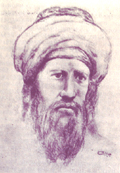As quoted in The Crusades Through Arab Eyes (1984) by Amin Maalouf, p. 37
Variant translations:
The world holds two classes of men; intelligent men without religion, and religious men without intelligence.
A Short History of Freethought Ancient and Modern (1906) by John Mackinnon Robertson, Vol. I, Ch. VIII: Freethought under Islam, p. 269
The world is divided into men who have wit and no religion and men who have religion and no wit.
This form of the statement has been most commonly misatributted — to Avicenna, in A Rationalist Encyclopaedia: A Book of Reference on Religion, Philosophy, Ethics, and Science (1950) by Joseph McCabe, p. 43, and later to Averroes, in The Atheist World (1991) by Madalyn Murray O'Hair, p. 46.
Original: اِثْنَانِ أَهْلُ الْأَرْضِ ذُو عَقْلٍ بِلَا دِينٍ وَآخَرُ دَيِّنٌ لَا عَقْلَ لَهُ
Famous Al-Maʿarri Quotes
“A little doubt is better than total credulity.”
As quoted in Leaving Islam: Apostates Speak Out (2003) by Ibn Warraq, p. 68
As quoted in The Diwan of Abu'l-Ala (1909) by Henry Baerlein, XLVII
As quoted in "The Meditations of Al-Maʿarri", Studies in Islamic Poetry (1921) by R. A. Nicholson, Verse 129, p. 110
As quoted in "The Meditations of Al-Maʿarri", Studies in Islamic Poetry (1921) by R. A. Nicholson, Verse 197, pp. 134–135
